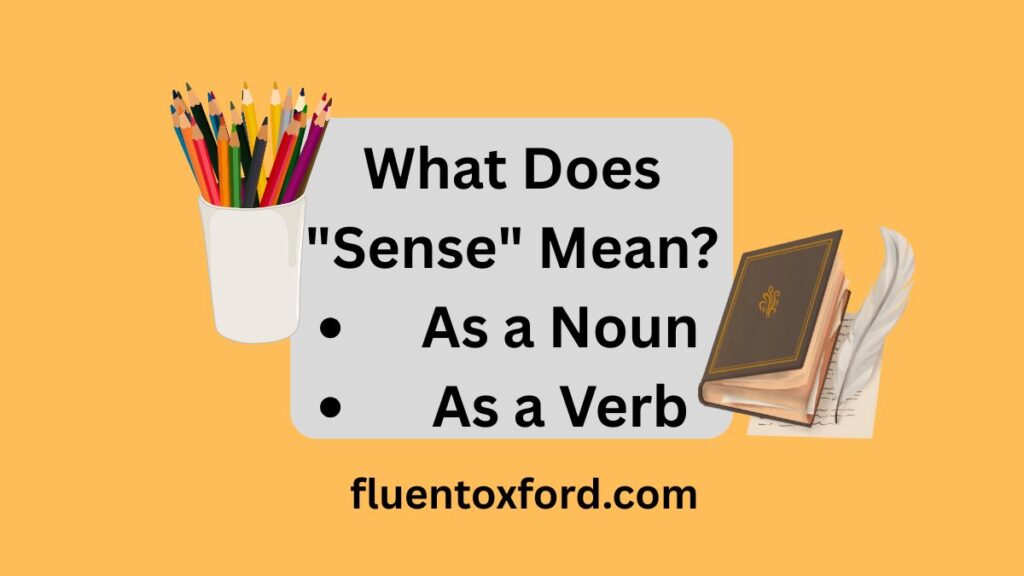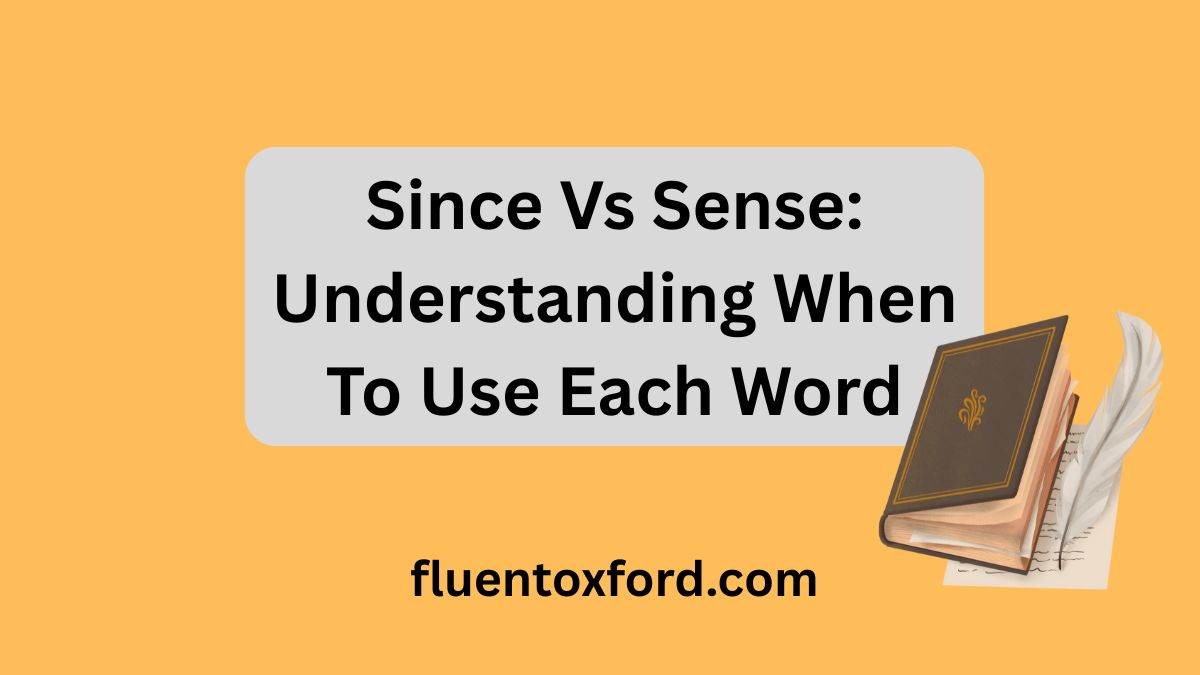“Since vs Sense: When to Use Each Word” refers to the correct understanding and usage of two commonly confused words in English. While “since” is primarily used as a preposition or conjunction to denote time or cause, “sense” functions mainly as a noun or verb, referring to perception, awareness, or meaning. Though they differ in meaning and grammatical role, their similar spelling and pronunciation often lead to confusion, making it essential to grasp their distinct applications in writing and conversation.
Mastering word choice is a powerful way to elevate communication skills. Misusing even a single word can shift the meaning of a sentence or reduce its clarity. That’s why exploring subtle differences like those between “since” and “sense” is not only helpful but also empowering for learners, professionals, and writers who aim for precision and credibility in their language.
This guide to “Since vs Sense: When to Use Each Word” is crafted to eliminate confusion by highlighting their unique roles through clear examples and practical usage tips. By the end, readers will gain confidence in distinguishing and correctly applying “since” and “sense,” ultimately enhancing both written and spoken expression.
Why “Since vs Sense” Is So Confusing
At first glance, “since” and “sense” seem easy enough. They sound alike but differ greatly in use. But when you’re writing or speaking, it’s easy to second-guess yourself. Is it “make sense” or “make since”? Do I say “since I was a child” or “sense I was a child”? These slip-ups are common.
That confusion often stems from
- Similar pronunciation (homophones in some dialects)
- Overlapping roles in syntax and grammar
- Multiple meanings for each word (polysemy)
Mastering their differences is not just about definitions. It’s about understanding word sense disambiguation, morphology, and contextual analysis. Let’s break it down.
What Does “Since” Mean?
“Since” is a versatile word in English. It functions as a preposition, conjunction, and adverb. In every role, it connects something to a starting point in time or a reason or cause.
As a Preposition
When used as a preposition, “since” refers to a point in time that marks the beginning of a period or event. It expresses the idea of time passing from a particular moment in the past up to the present. It can also be used to show a cause or reason.
Example: I’ve been working here since 2015.
As a Conjunction
As a conjunction, “since” is used to connect two clauses, indicating time or cause. It can be used to express a reason for something (similar to “because”) or to refer to a time in the past continuing to the present.
Example: Since it was raining, we stayed indoors.
As an Adverb
When “since” is used as an adverb, it refers to a time that has passed after an event. It often implies that something has not happened in the time period that followed a specific event or moment.
Example: I saw her last week but haven’t heard from her since.
Key Takeaways
- Always relates to time and reason.
- Often interchangeable with “because” when used causally.
- Think of “since” as a time traveler or a reason-giver.
Common Phrases with “Since”:
- Ever since
- Since when?
- Since then
Related words: because, as, from, due to
What Does “Sense” Mean?

“Sense” is all about understanding and perception. It helps describe feelings, awareness, and the way we comprehend the world. It can be used as a noun or a verb.
As a Noun
- Perception or feeling through the five senses
- Logical or emotional understanding
Example: That doesn’t make sense.
Example: My sense of smell is strong.
As a Verb
- To feel, detect, or become aware of something
Example: I could sense the tension in the room.
Key Takeaways
- Relates to the mind and body
- Your internal compass for what feels right or wrong
- Tied to cognition, awareness, and emotional insight
Common Phrases with “Sense”:
- Common sense
- Make sense
- Lose all sense of time
Related words: intuition, perception, awareness, logic
Quick Comparison: “Since” vs “Sense”
Here’s a side-by-side table to help you choose the right word every time:
| Feature | Since | Sense |
| Part of Speech | Conjunction, Preposition, Adverb | Noun, Verb |
| Primary Meaning | Time or reason | Feeling or understanding |
| Examples | Since 2020, since it rained | Make sense, sense danger |
| Keyword Association | Time, cause | Perception, feeling |
| Replaces | Because, from | Understand, feel |
Word Origins: Etymology of “Since” and “Sense”
The evolution of “since” and “sense” reflects the rich history of the English language. “Since” developed through Old English and Middle English, maintaining its association with time and causality. “Sense” further expanded its meaning from physical perception to abstract understanding, influenced by philosophical thought, especially during the Renaissance.
The Word “Since”
- From Latin scindere (to split) and later sciens (knowing)
- Rooted in expressions of time and knowledge
- Evolved into English in the Middle Ages
The Word “Sense”
- From Latin sensus, meaning “feeling” or “perception.”
- Related to sensory experience and emotional intelligence
- Developed into usage for logic and meaning
These origins reflect their modern roles: “since” as a time or cause connector and “sense” as an insight or physical awareness.
How to Never Mix Them Up Again
Use These Mnemonics:
- Since = Time or Cause (“I’ve waited since morning.”)
- Sense = Feeling or Logic (“That makes sense”)
Ask Yourself:
- Can I replace the word with “because”? If yes, use since.
- Does it involve understanding or physical senses? Then it’s sense.
Language Tools and Techniques to Remember the Difference

Contextual Analysis
- Read the sentence aloud.
- Identify the syntax—what role is the word playing?
Morphology
- “Since” never changes form.
- “Sense” can become “sensed,” “sensing,” or “senses.”
Word Sense Disambiguation
- Use clues from nearby words.
- Spot hints of time vs. perception.
Word Usage Tips:
- Avoid using “sense” when indicating time.
- Never write “make since” – it’s always “make sense.”
Practice in Real Sentences
When writing or speaking, using the correct word helps avoid confusion. Use “since” when talking about time or giving a reason, like “I’ve been here since morning” or “Since it was cold, we stayed inside.” Use “sense” when you talk about meaning or feeling, such as “That idea makes sense” or “I sense danger nearby.”
Practice by creating simple sentences and checking if you’re talking about time/reason (use since) or understanding/perception (use sense). This habit will build confidence and help your language sound natural and correct in real-life situations.
Sentences with “Since” (Time and Reason)
- Since last summer, we haven’t spoken.
- I didn’t go outside since it was too hot.
- She’s grown a lot since starting college.
- They’ve been friends since high school.
- He has worked at the company since he graduated.
- Since you’re already here, let’s start the meeting.
- Since he was tired, he went to bed early.
- Since she studied hard, she passed the exam.
Sentences with “Sense” (Understanding and Perception)
- That doesn’t make sense to me.
- He lost his sense of smell after the flu.
- I sense you’re not being honest.
- She has a strong sense of responsibility.
- I could finally sense the meaning of the story.
- Dogs have a sharp sense of smell.
- I sense that something is wrong.
- Her sense of hearing is very sensitive.
Alternatives and Synonyms

When you want to vary your language or fine-tune your tone, use these alternatives:
Alternatives to “Since”
- For time: from, starting at, after
- For reason: because, as, due to
Alternatives to “Sense”
- For perception: intuition, instinct, awareness
- For understanding: logic, clarity, rationale
Case Study: Common Grammar Error in Business Emails
Incorrect: “Make since of the attached budget report.”
Correct: “Make sense of the attached budget report.”
Why it matters: Grammar errors can damage credibility in professional settings. One simple mistake, like confusing “sense” and “since,” can make readers question your attention to detail.
Pro Tip: Use spelling and grammar tools like Grammarly or Hemingway Editor to catch homophone mix-ups.
Conclusion
Understanding the difference between similar words helps improve your English. The topic “Since vs Sense: When to Use Each Word” teaches us how small changes in word choice can affect meaning. “Since” often shows time or reason, while “sense” talks about feeling, meaning, or understanding. Learning when and how to use each one makes writing and speaking clearer.
By remembering the key meanings and using examples, you can avoid confusion. This makes your communication stronger and more professional. The guide on “Since vs Sense: When to Use Each Word” gives you simple rules to follow. With practice, these words will become easier to use in daily life. Keep learning, and you’ll build a more confident and accurate vocabulary.
FAQs
Q: What’s the main difference between “since” and “sense”?
“Since” relates to time and reason, while “sense” refers to perception or understanding.
Q: Can “since” ever be used in place of “sense”?
No—“since” can’t replace “sense.” They’re not interchangeable and serve entirely different grammatical functions.
Q: Why do people confuse “since” with “sense”?
Because they sound similar in some accents (they’re near-homophones), people often misuse them in writing or casual speech.
Q: Is it ever correct to say “make since”?
Never. The correct phrase is always “make sense,” meaning something is logical or understandable.
Q: Are tools available to help catch mix-ups like “since” vs. “sense”?
Yes—tools like Grammarly, Hemingway Editor, and ProWritingAid help flag these errors in real time.

As an admin at Fluent Oxford, Maida Queen is the driving force behind our vibrant learning community. With a deep passion for English language education, she ensures that our platform remains a dynamic, engaging, and supportive space for learners worldwide.
Maida expertly manages content, assists users with their grammar and fluency queries, and fosters an interactive environment where learning feels effortless and enjoyable. Whether you need guidance, motivation, or just a friendly face in the Fluent Oxford community, Maida is always there to help you reach your English language goals.








